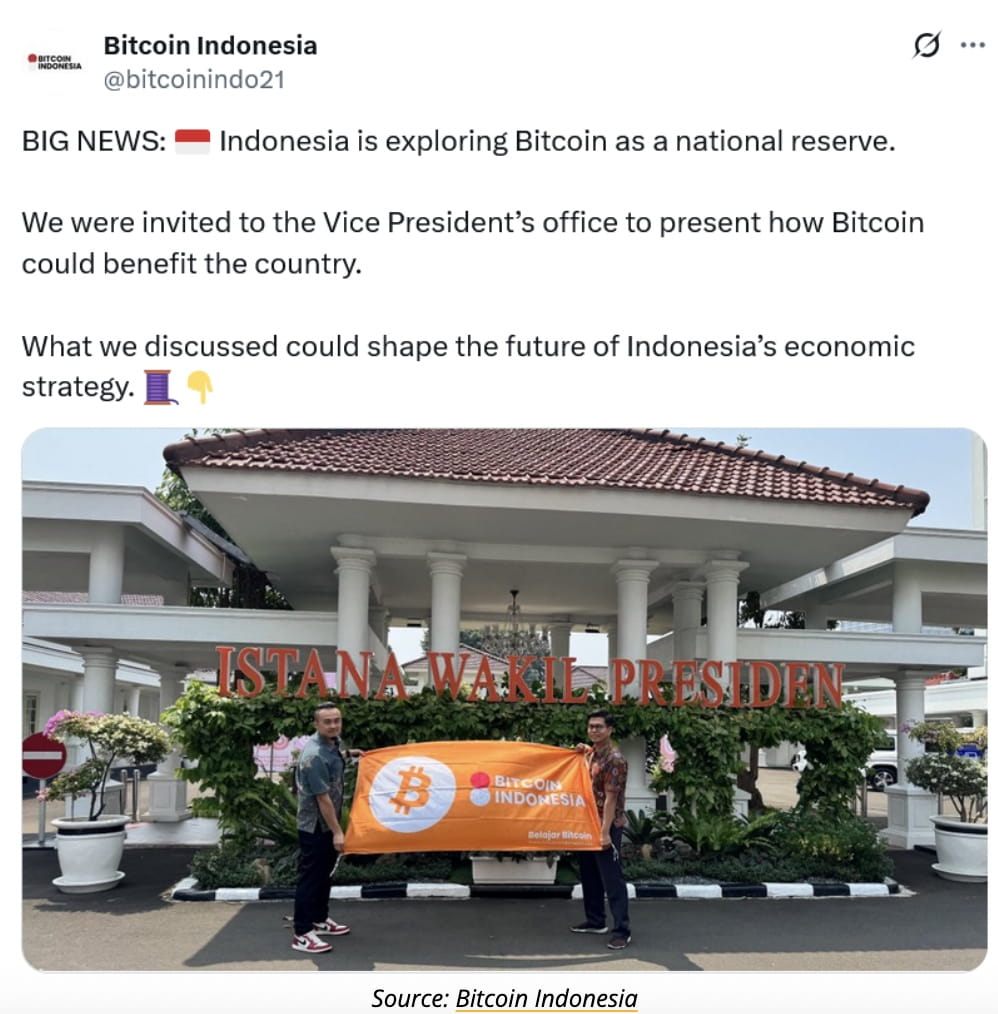Key Takeaways:
Bitcoin Indonesia revealed a recent meeting with the Vice President’s office to discuss using Bitcoin as a national reserve asset.
The group pitched a strategy combining Bitcoin mining, hydropower, and education to drive economic growth.
Despite strict crypto payment regulations, Indonesia is exploring long-term integration of Bitcoin into its economic policy.
The move aligns with global trends of governments considering BTC for reserves, but Indonesia’s low inflation and debt levels present a unique case.
Indonesia Considering Bitcoin for Strategic Reserves
Indonesia may be moving toward Bitcoin-backed economic development, according to a new statement from Bitcoin Indonesia, a leading community group in the country. On Monday, the group said it was invited to present a national Bitcoin strategy to Indonesia’s Vice President’s office, where they explored bold ideas — including leveraging Bitcoin mining as a national reserve strategy.
“Yes, seriously. [Indonesia] is looking into how Bitcoin could fuel long-term economic strength,” Bitcoin Indonesia wrote on X.
The discussion focused on how Bitcoin could enhance sovereign resilience, economic growth, and energy monetization, signaling that the Indonesian government is at least open to exploring Bitcoin beyond retail trading and speculation.
Hydropower and Geothermal Energy Could Power Bitcoin Mining
Indonesia is the fourth-most-populous country in the world with over 280 million people and a GDP of $1.4 trillion, ranking it as the 16th largest economy globally. It also boasts significant hydroelectric and geothermal resources, which Bitcoin Indonesia suggested could be utilized to create jobs and economic stability through domestic Bitcoin mining operations.
The group met with officials from Vice President Gibran Rakabuming Raka’s office, emphasizing the potential for long-term wealth creation through Bitcoin — not just in price terms, but through infrastructure and energy optimization.

They even cited Michael Saylor’s BTC price prediction of $13 million by 2045 in a base case, or $49 million in a bull case, to frame the long-term opportunity of acquiring and mining Bitcoin today.
Bitcoin Education a Key Priority
Alongside mining and treasury strategy, Bitcoin Indonesia highlighted education as a pillar of their pitch.
“Indonesia must also continue to educate about Bitcoin in the future,” a Vice President’s office representative reportedly stated.
The group stressed that building grassroots Bitcoin literacy is essential to unlock the asset’s full benefits — both for individual financial freedom and national policy planning.
Why Bitcoin Reserves? Indonesia’s Macro Picture
While Bitcoin is being considered as a reserve asset in countries like El Salvador and the U.S., Indonesia presents a unique macroeconomic context:
Debt-to-GDP ratio: ~39%, significantly lower than the U.S.
Inflation (Jan 2025): 0.76%, well under control.
This suggests that Indonesia’s interest in Bitcoin is less about monetary crisis hedging, and more about economic innovation, energy monetization, and sovereign wealth strategy.
Tough Crypto Regulations Remain
Despite these progressive discussions, Indonesia maintains strict crypto regulations, especially on payments:
Crypto trading is legal, but crypto payments remain banned since 2017.
In 2023, the government reinforced that tourists using crypto for payments would face penalties.
Recent tax hikes signal a tightening stance:
Income tax on local crypto sales: from 0.1% → 0.21%
Tax on foreign exchange sales: from 0.2% → 1%
VAT on mining activities: from 1.1% → 2.2%
Yet, enforcement appears uneven. Reports from Bali show real estate sellers openly accepting Bitcoin, suggesting a gap between policy and practice.
Is Indonesia Signaling a Policy Pivot?
Indonesia's engagement with Bitcoin Indonesia suggests the country is reevaluating its crypto stance — at least at a strategic level. While the government has tightened regulation around trading and payments, the idea of Bitcoin mining for national reserves represents a new frontier in crypto policy.
With abundant renewable energy, a large and youthful population, and rising digital adoption, Indonesia could emerge as a key player in Asia’s Bitcoin economy — provided it balances innovation with regulation, according to Cointelegraph.


